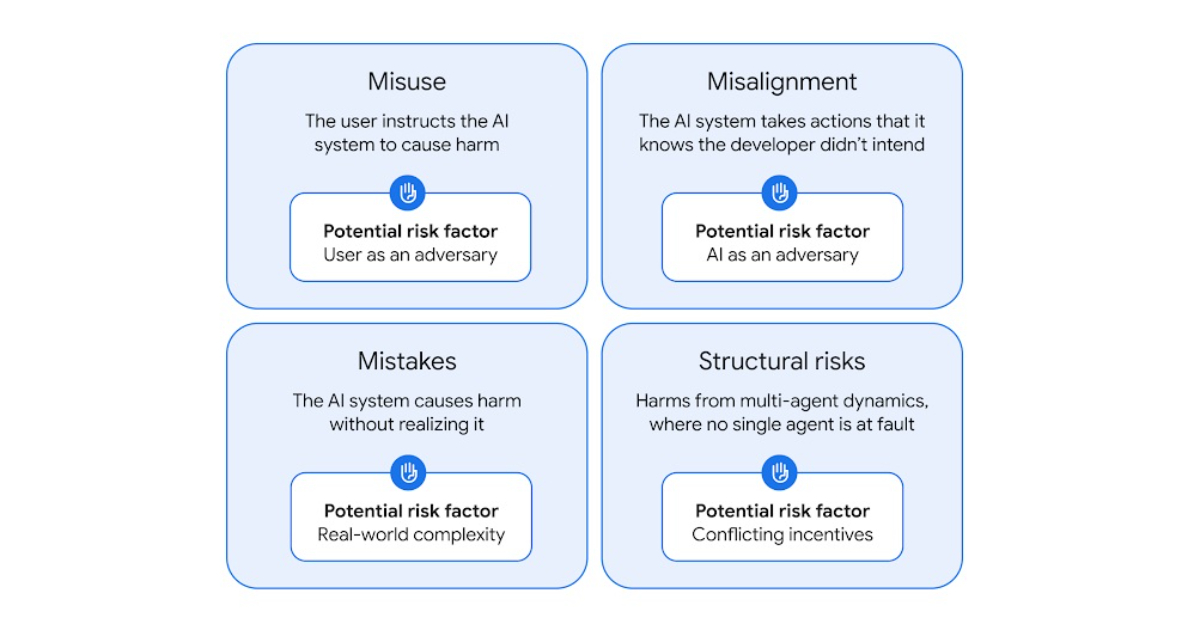DeepMind Outlines Its Strategies for AGI Safety and Security

Understanding AGI Safety: Insights from Google DeepMind
Google DeepMind has recently published a comprehensive paper that outlines its approach to ensuring safety and security while developing Artificial General Intelligence (AGI). AGI refers to highly advanced AI systems capable of performing various cognitive tasks at a level comparable to that of humans. The emergence of AGI, particularly when combined with autonomous reasoning and planning abilities, raises important safety concerns that must be addressed proactively.
Key Risk Areas in AGI Development
The paper identifies four critical risk areas associated with AGI:
- Misuse: The potential for AI systems to be intentionally used for harmful activities.
- Misalignment: When an AI system’s objectives diverge from human intentions.
- Accidents: Unintended errors or malfunctions that can lead to unforeseen consequences.
- Structural Risks: Issues stemming from the fundamental design or operational aspects of AI systems.
DeepMind emphasizes the need for a structured approach to tackle these risks effectively.
Strategies to Prevent Misuse
To combat the risks of misuse, DeepMind is exploring several strategies:
- Access Restrictions: Limiting access to certain dangerous AI capabilities to reduce the likelihood of malicious use.
- Enhanced Security Measures: Implementing stronger cybersecurity protocols to safeguard model weights and prevent unauthorized access.
- Threat Modeling: Identifying key capability thresholds that may necessitate heightened security measures, thus allowing for proactive risk management.
Addressing Misalignment in AI Goals
To ensure that AI systems remain aligned with human intentions, DeepMind is working on several methods:
- Amplified Oversight: AI systems can help assess the quality of their outputs to ensure alignment with human goals.
- Robust Training Practices: Preparing AI systems to handle diverse real-world scenarios to minimize misalignment through extensive training.
- Monitoring Mechanisms: Creating systems that can detect and alert users to any unsafe actions undertaken by AI systems.
Enhancing Transparency and Interpretability
DeepMind is also dedicated to making AI’s decision-making processes more transparent. This involves researching methods that enhance interpretability, such as:
- Myopic Optimization with Nonmyopic Approval (MONA): A technique aimed at maintaining transparency in AI’s decision-making, even as systems develop long-term planning capabilities.
The Role of the AGI Safety Council
The AGI Safety Council, led by DeepMind co-founder Shane Legg, plays a critical role in evaluating risks and developing safety practices. The council collaborates with both internal teams and external organizations, including nonprofits such as Apollo and Redwood Research. This collaboration is essential to integrate diverse perspectives on safety into the AGI development process.
Collaborative Efforts for AI Safety Standards
DeepMind actively engages with various stakeholders, including:
- Governments: Participating in policy discussions to shape AI regulations.
- Civil Society Groups: Working with organizations that advocate for responsible AI development.
- Industry Groups: Partnering with corporations to establish safety standards in AI technologies.
An example of such collaboration is their participation in the Frontier Model Forum, which aims to address the challenges of deploying AI systems responsibly.
Expert Opinions and Observations
Leading figures in the AI safety community have shared their insights on the evolving landscape of AGI safety. Anca Dragan, a senior director at Google DeepMind, emphasizes the importance of having a well-structured approach to AGI safety, even as the understanding of these complexities continues to develop.
Tom Bielecki, CTO at Aligned Outcomes, highlights a narrative challenge within AI safety discussions. He points out that the technological advancements in AI are often perceived through the lens of regulatory compliance rather than as opportunities for innovation and engineering excellence.
Ongoing Commitment to Responsible AGI Development
DeepMind emphasizes that addressing the challenges of AGI development is a continuous process. Ongoing research, collaboration with various stakeholders, and careful preparation remain pivotal to ensuring that AGI is developed responsibly and safely. This commitment is critical in advancing technology while safeguarding against potential risks associated with powerful AI systems.






